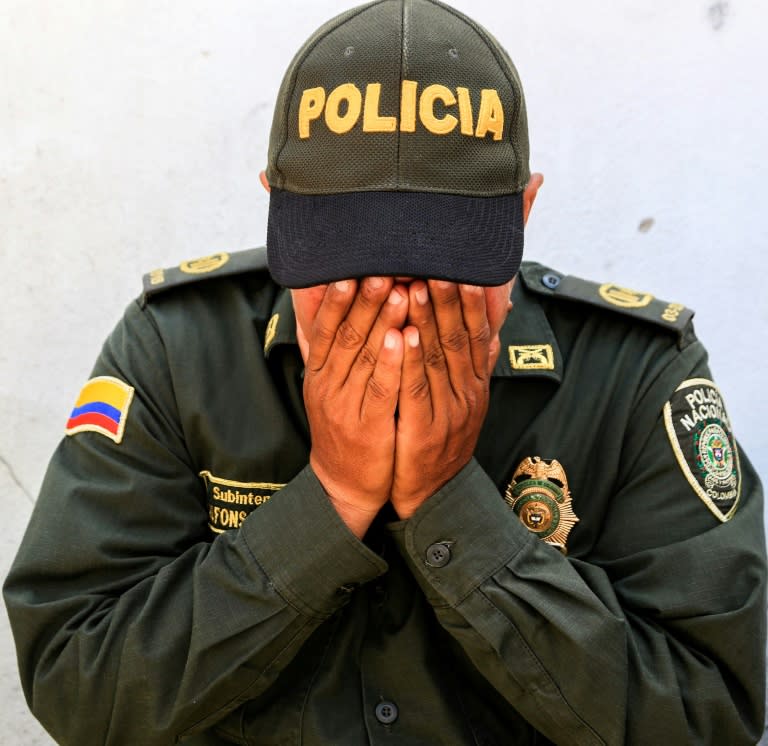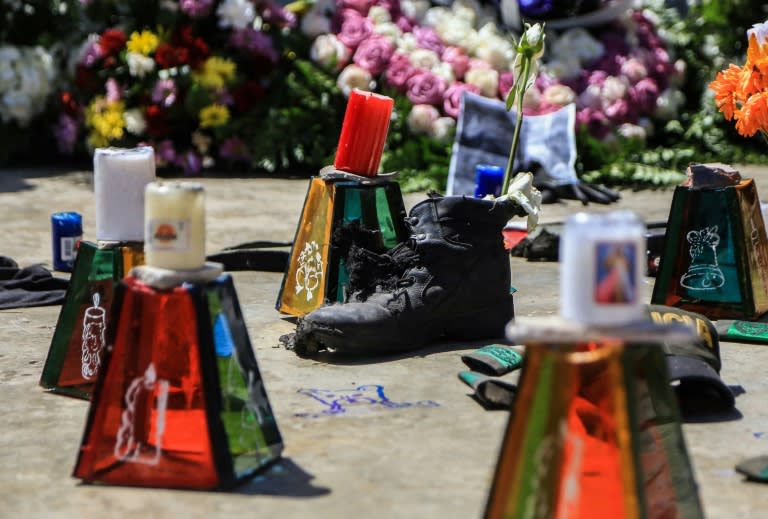Colombia freezes peace talks with rebels after attacks
Colombia's president on Monday froze peace negotiations with the ELN rebel group and ordered a stepped-up military response after weekend bomb attacks blamed on the guerrillas killed seven police officers. The developments threw into peril efforts to definitively end Colombia's half century of conflict that until recently had appeared close to resolution. "I have taken the decision to suspend the start of the fifth cycle of negotiations that were scheduled for the coming days, given that ELN is not matching its words with actions," President Juan Manuel Santos said in an address. He ordered security forces to act, "with maximum determination," against the ELN. They will be "fighting terrorism vigorously, as if there were no peace negotiations," Santos said. Santos's government reached a historic peace agreement with Colombia's biggest rebel group, the FARC, in November 2016, but a similar deal with the smaller ELN -- estimated to number 1,800 fighters -- has still not been reached. When a ceasefire with the ELN expired on January 10, the government said it was suspending talks with the rebel group, which returned to targeting security forces and oil installations. Colombia's military has in turn carried out an offensive that has resulted in dozens of deaths and arrests. The United States condemned the attacks in Colombia and another, apparently unrelated one near the border in neighboring Ecuador that left 28 police and civilians wounded. "The United States stands with the people of Colombia and Ecuador and will help both countries in any way we can in response to these attacks," State Department spokeswoman Heather Nauert said in a statement expressing condolences the families of those killed and hurt. - Three bomb attacks - Over the weekend, three bombs went off at police stations in three locations: two in the Caribbean port city of Barranquilla and one in Santa Rosa, in the department of Bolivar. The ELN claimed responsibility for the worst of the attacks, which killed five officers and wounded 41 in Barranquilla on Saturday as police were assembling for roll-call. Defense Minister Luis Carlos Villegas put the blame for all three of these "terrible acts of terrorism" on the ELN. He hinted that Santos could respond by ordering the military to go on the offensive against the rebel group. A 31-year-old suspect in Saturday's blast was taken into custody, with Villegas saying: "This person has a very clear record with the ELN." Five police officers were injured in the second Barranquilla bombing, which exploded at another police station early Sunday. Two more police officers were killed when a bomb went off late Saturday at their outpost in Santa Rosa. - 'Gloomy' outlook - Santos, who won the Nobel Peace Prize in 2016 and who is due to step down in August after serving two mandates, had hoped to make peace with the ELN to end a long conflict that has drawn in drug traffickers and right-wing paramilitary groups as well as the leftist guerrilla forces. His government opened talks with the ELN a year ago in Ecuador after reaching the peace agreement with the FARC, which has now disarmed and transformed itself into a political party. After the end of the ceasefire, Santos had said on January 21 that he would seek a new truce with the ELN in a bid to salvage the talks. The rebels had indicated a willingness to resume negotiations. But the ELN, unlike the FARC, has a federated structure with autonomous military units, which experts say makes a settlement more difficult. "The scenario is really gloomy for a continuation of the negotiations," Camilo Echandia from the Externado University of Colombia told AFP. Among those denouncing the latest attacks was Rodrigo Londono, the former leader of the FARC and now a presidential candidate in elections set for May. "All our solidarity is for the relatives of the slain police," he wrote on Twitter. Right-wing candidates in the upcoming election have urged the government to break off talks with the ELN entirely. On Monday, Santos spoke with his chief negotiator in the talks with the ELN, Gustavo Bell. The president said talks with the rebels could only continue when "the ELN aligns its conduct with the peace demands of the Colombian people and the international community."




